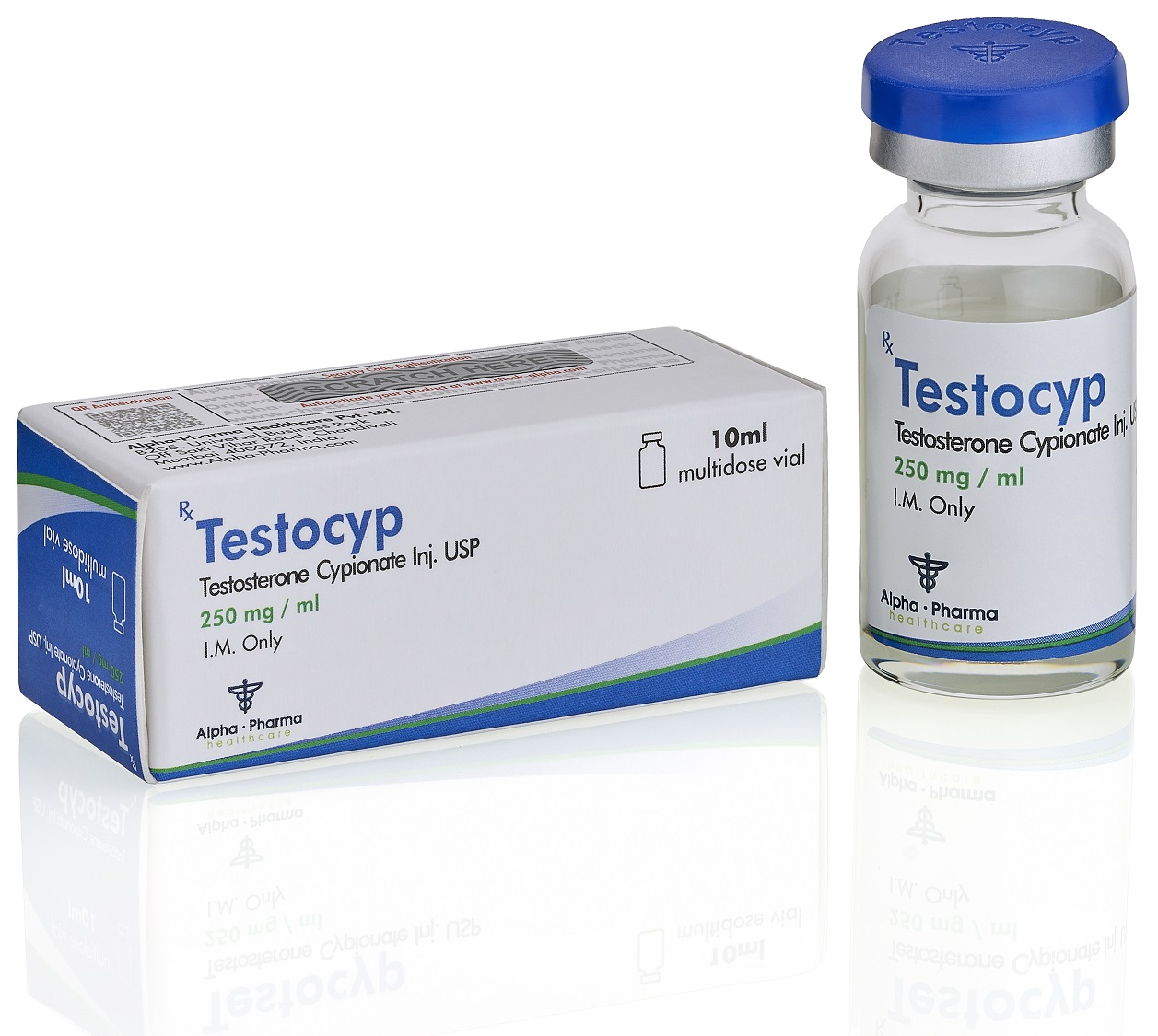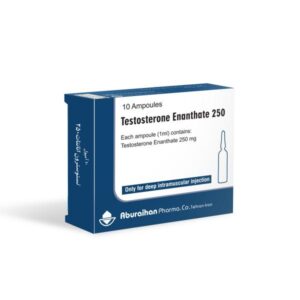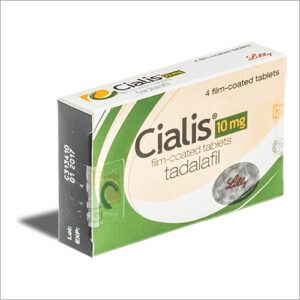Description
Highlights for testosterone cypionate
- Testosterone cypionate injectable solution is available as a brand-name drug and a generic drug. Brand name: Depo-Testosterone.
- Testosterone cypionate comes only in the form of an injectable solution given into your muscle. You can give this medication to yourself at home after your doctor shows you how.
- Testosterone cypionate is used to treat symptoms of hypogonadism in males. In this condition, males don’t produce enough of the sex hormone testosterone.
Note: In this article, we use the term “male” to refer to someone’s sex assigned at birth. For information about the difference between sex and gender, see this article.
Important warnings
- Heart effects warning: There haven’t been any long-term studies done to know whether testosterone replacement therapy in males has a negative effect on heart health. However, short-term studies have shown that this drug may increase your risk of heart attack or stroke, or even be fatal.
- Liver problems warning: Using high doses of this drug for a long period can increase your risk of liver problems, including liver cancer. These are serious conditions that can be life threatening.
- Blood clots warning: This drug may raise your risk of developing blood clots in your lungs or the deep veins of your legs.
- Misuse warning: Testosterone can be misused (using a drug differently than how it’s prescribed). There is an increased risk if you receive higher doses of the drug than your doctor prescribes, or if you use it along with other anabolic steroids. Misusing testosterone can lead to serious health problems. These problems include heart attack, heart failure, depression, and psychosis. Your doctor can tell you more about the risks of testosterone misuse.
What is testosterone cypionate?
Testosterone cypionate is a prescription drug. It comes as an injectable solution given into muscle. Testosterone cypionate is a self-injectable drug. You can give this medication to yourself at home after your doctor shows you how to do so.
Testosterone cypionate is available as the brand-name drug Depo-Testosterone. It’s also available as a generic drug. Generic drugs usually cost less than the brand-name version. In some cases, they may not be available in every strength or form as the brand-name drug.
Testosterone cypionate is a controlled substance. This means it’s regulated by the U.S. government.
Why it’s used
Testosterone cypionate is used to treat symptoms of hypogonadism in males. With this condition, males don’t produce enough of the sex hormone testosterone.
Low testosterone levels in males can lead to mood changes, difficulty concentrating, erectile dysfunction (trouble getting or keeping an erection), and low sex drive. It can also cause reduced growth of the penis and testicles, gynecomastia (breast growth), loss of body hair and muscle mass, anemia (low level of red blood cells), and osteoporosis (weakened bones).
There are two types of hypogonadism: primary and hypogonadotropic. This drug may be used to treat both.
- Primary hypogonadism occurs when the testicles can’t produce enough testosterone.
- Hypogonadotropic hypogonadism occurs when there is damage to parts of the brain (hypothalamus or pituitary gland) that tell the testicles to produce testosterone.
Testosterone cypionate is also prescribed off-label for testosterone therapy for transgender males and gender diverse people. Off-label means a doctor can prescribe the medication for a different use than what it was approved for.
Note: In this article, we use the term “male” to refer to someone’s sex assigned at birth. For information about the difference between sex and gender, see this article.
How it works
Testosterone cypionate belongs to a class of drugs called androgens. A class of drugs is a group of medications that work in a similar way. These drugs are often used to treat similar conditions.
Testosterone cypionate works to treat hypogonadism in males by replacing the testosterone the body is unable to make.
How quickly does testosterone cypionate work?
Testosterone cypionate starts to work as soon as you give yourself a dose. However, it may take 3 weeks or more before you start to feel symptoms of your condition ease. For more information about when to expect symptom reduction after you start using testosterone cypionate, talk with your doctor.
Testosterone cypionate side effects
Testosterone cypionate can cause mild or serious side effects. The following list contains some of the key side effects that may occur during testosterone cypionate treatment. This list does not include all possible side effects.
For more information on the possible side effects of testosterone cypionate, or tips on how to manage a bothersome side effect, talk with your doctor or pharmacist.
More common side effects
The more common side effects of testosterone cypionate can include:
- acne
- pain and swelling at the injection site
- hair growth
- gynecomastia (breast enlargement)
- more frequent erections
- erections that last longer than usual
- mood changes
- headache
- decrease in sperm count when the drug is used at high doses
If these effects are mild, they may go away within a few days or a couple of weeks. If they’re more severe or don’t go away, talk with your doctor or pharmacist.
Serious side effects
Call your doctor right away if you have serious side effects. Call 911 if your symptoms feel life threatening or if you think you’re having a medical emergency. Serious side effects and their symptoms can include the following:
- Heart attack. Symptoms can include:
- chest pain
- shortness of breath
- discomfort in your upper body
- Stroke. Symptoms can include:
- weakness in one part or side of your body
- slurred speech
- Enlargement of your prostate gland. Symptoms can include:
- frequent or urgent need to urinate
- nocturia (need to urinate more often at night)
- trouble starting urination
- weak urine stream or a stream that stops and starts
- dribbling at the end of urination
- straining while urinating
- not being able to completely empty your bladder
- Prostate cancer. Your doctor should check for prostate cancer or any prostate problems before and during treatment with this drug, especially if you’re age 65 years or older.
- Liver problems. Symptoms can include:
- nausea
- vomiting
- abdominal pain and swelling
- swelling in your legs and ankles
- bruising more easily than usual
- pale-colored stool
- unusual or unexplained tiredness
- loss of appetite
- dark-colored urine
- yellowing of your skin or the whites of your eyes
- Deep vein thrombosis (blood clots in the deep veins of your legs). Symptoms can include:
- swelling of your leg
- pain in your leg
- Pulmonary embolism (blood clots in your lungs). Symptoms can include:
- shortness of breath
- chest pain or discomfort that gets worse when you take a deep breath or when you cough
- feeling lightheaded or dizzy, or fainting
- fast pulse
- coughing up blood
- Polycythemia (increase in your red blood cell count). Symptoms can include:
- reddening or discoloration in your face
- headaches
- confusion
- stroke
- blood clots
- tiredness
- decrease in mental alertness





